
Google SEO 2021: How to use keywords smart for better ranking
Google continues to update its algorithm to improve the quality of its services. Yes! High-value content and relevant backlinks are still at the heart of any SEO strategy after these core updates. But what about keywords?
We wanted to know how keyword usage impacts ranking in 2021, so we looked at the data. In this article, we’ll explain what we’ve noticed during this analysis.
Spoiler alert! Keywords still matter, and you want to continue to pay attention to most of the good stuff you’ve been doing until now. Let’s take a closer look.

Why This Analysis?
As Google moved from matching keywords to understanding meaning, SEO techniques involving keywords have changed. Now that we’re stepping into a new SEO era – one dominated by voice and “zero-click” search, we wanted to see how much keyword placement still impacts SERPs.
We chose the primary keyword we know best — “SEO” — and used WDF/IDF analysis to identify the semantically related keywords most likely to impact rankings. We looked for patterns to see which of the old keyword tips and tricks still worked and what didn’t work anymore.
Here’s what we wanted to find out:
1. Do the following old school parameters still have an impact on the search results?
● Keyword in top-level domain
● Keyword in URL
● Keyword in title and description
● Semantically related keywords in titles and description tags
2. How does breadcrumb navigation impact SERPs?
We spread our research across four languages (English, German, French, and Russian), ten countries (The US, The UK, Australia, Germany, Austria, Switzerland, France, Belgium, Ukraine, and Russia), and 6882 websites. Here’s what we found out.
Correlation Explainer
Correlation = how likely it is that a value increase/decrease of a metric leads to higher rankings. Values range between -1 and 1. In our case, a positive correlation means that using this value worsens the ranking negative correlation leads to better ranking.
Many different factors can affect a page’s ranking, so a correlation absolute value of 0.1 or above is reasonably high. For example, if a value is -0.33 (has a negative correlation with the absolute value equals or more than 0.1), we would expect a page with this value to rank higher.
Correlation ≠ Causation – Correlation doesn’t state that improving a score in a metric will increase rankings. It only means that it’s associated with a good page ranking.
Before we take a closer look at the data, here’s what you should know about keywords and SEO in 2021.
Keywords Aren’t Dead!
Google understands the intent behind queries, and its NLP-empowered algorithm can read through your content to make meaning out of your blogs and web pages. Does it mean keywords are no longer necessary to tell Google what your page is about?
Not really. Keywords and semantically related keywords are still significant factors that can influence your website’s position in search results. However, things look a little different from what we used to see in charts a few years ago. The focus is no longer on placing the main keyword strategically in metadata and URLs. As Google has evolved, it also learned to read between the lines, making more sense now to prioritize clarity over strategic keyword usage.
Furthermore, you want to pay more attention to what semantically related keywords you integrate into your content. Instead of adding the words that “feel right,” you want to use data to find the terms and phrases your public is more likely to respond to when consuming content.
Multilingual Keyword Research Is Essential
As Google got better at reading your content, it also taught its algorithm to pay attention to language and cultural differences. The search engine is now aware that people in different countries make different queries even when they use the same language to provide personalized content to match expectations.
If you manage multilingual websites, you want to perform keyword and semantically related keyword research in every country and region you target. Keyword translation has never been a thing in international SEO. Now that Google understands search intent and wants to deliver content that is easy to understand by its users, it will favor the website that speaks as its customers do in all languages.
So, your website’s American and British versions might have to use different semantically related keywords in metadata for SEO reasons. Keyword localization is more important than ever. If you want to make it to page 1, you need to run keyword analysis in every country and look at the local data before making SEO decisions.

So, Where Do We Place Keywords?
1. Keywords in top-level domains
Google doesn’t care anymore about whether your top-level domain includes a specific keyword. Our data in all four languages confirmed what John Müller, Search Advocate at Google, said during one of Ask Google Webmasters videos: “You don’t get a special bonus like that from having a keyword in your top-level domain.”
So, if you plan to rank for a new main keyword, go for it regardless of what words you have in your top-level domain.
2. Keywords and semantically related keywords in metadata
Overall, the research across languages showed that strategically placing the primary keyword you want to rank for and some semantically related keywords in URLs, titles, and descriptions can influence your position in search results.
We looked at the data for each language (in different countries). It confirmed that what semantically related keywords you decide to use and how often you use them are vital for SEO.
Language: English
Countries: The US, The UK, Australia
Primary keyword: SEO
Semantically related keywords: “search engine optimization” (for the US)/“search engine optimisation” (for the UK and Australia), “Google,” and “search engines”
Findings and keyword best practices:
● A keyword’s popularity changes with time:
○ We noticed that “search engine optimization” is slowly becoming more powerful than “SEO” in titles.
○ However, it doesn’t mean you can simply substitute one term for another and hope it works. As these transitions happen, it’s important to test multiple combinations of keywords regularly to see which performs better.
○ If you localize for multiple countries, you should test for each market individually.
○ For example, “SEO” in titles and descriptions has a different impact depending on where you make the query from, even if you use the same language (the US vs. the UK).
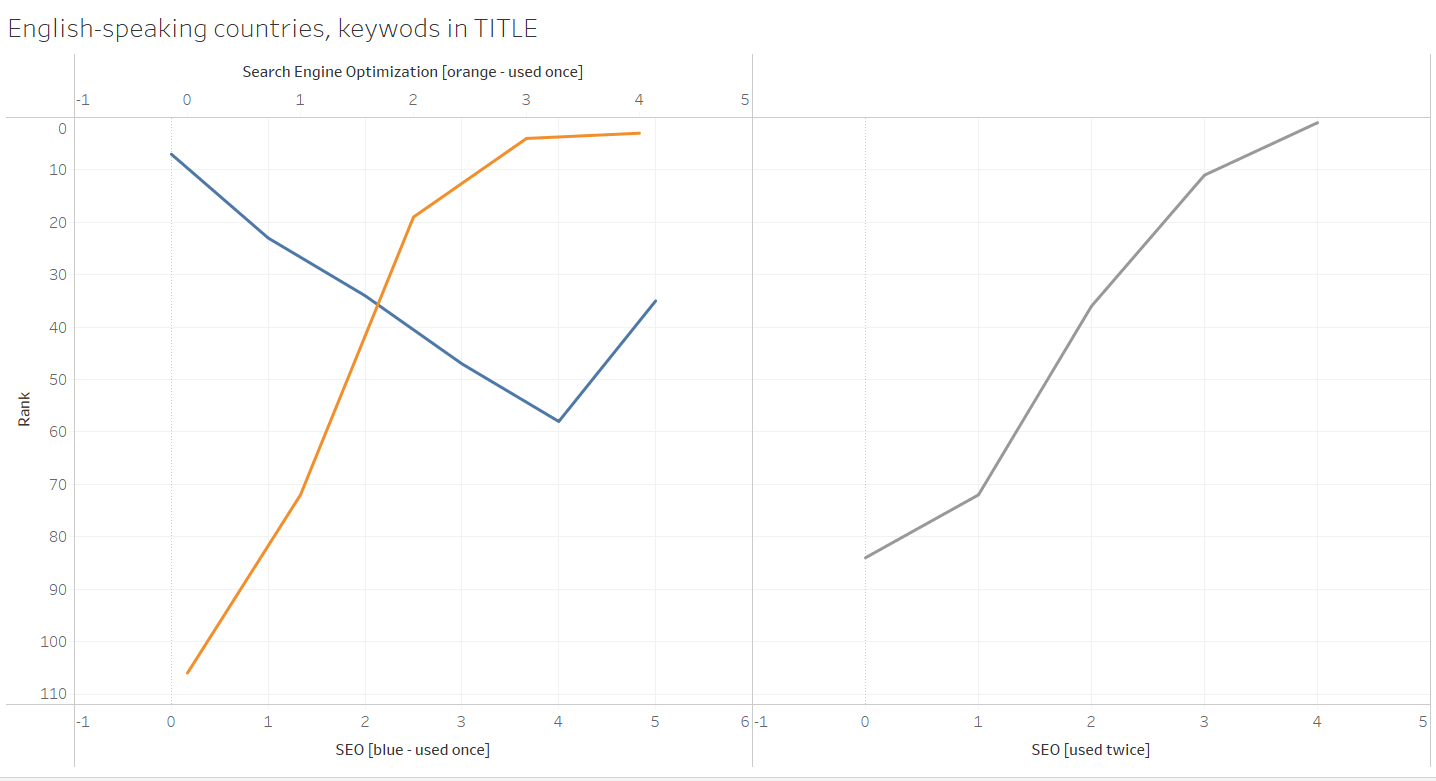 ● The usage of specific semantically related keywords in metadata can negatively impact your rankings.
● The usage of specific semantically related keywords in metadata can negatively impact your rankings.
○ The data showed that Google doesn’t “like” it when we use its name in URLs and metadata.
○ In all three countries, the US, the UK and Australia, we saw that including the word “Google” in URLs makes the search engine penalize your page. While the term is a semantically related keyword to the primary keyword, SEO, it might be better to test it in your constalation before using in the metadata.
○ Whenever you experiment with semantically related keywords, test them for each language and region to ensure the algorithm doesn’t penalize your local pages.
○ Pay attention to the spelling differences between countries. The slight difference between “search engine optimiZation” and “search engine optimiSation” can impact your rankings in the UK. And, as you know, one position higher or lower in search results can make a significant difference for your traffic.
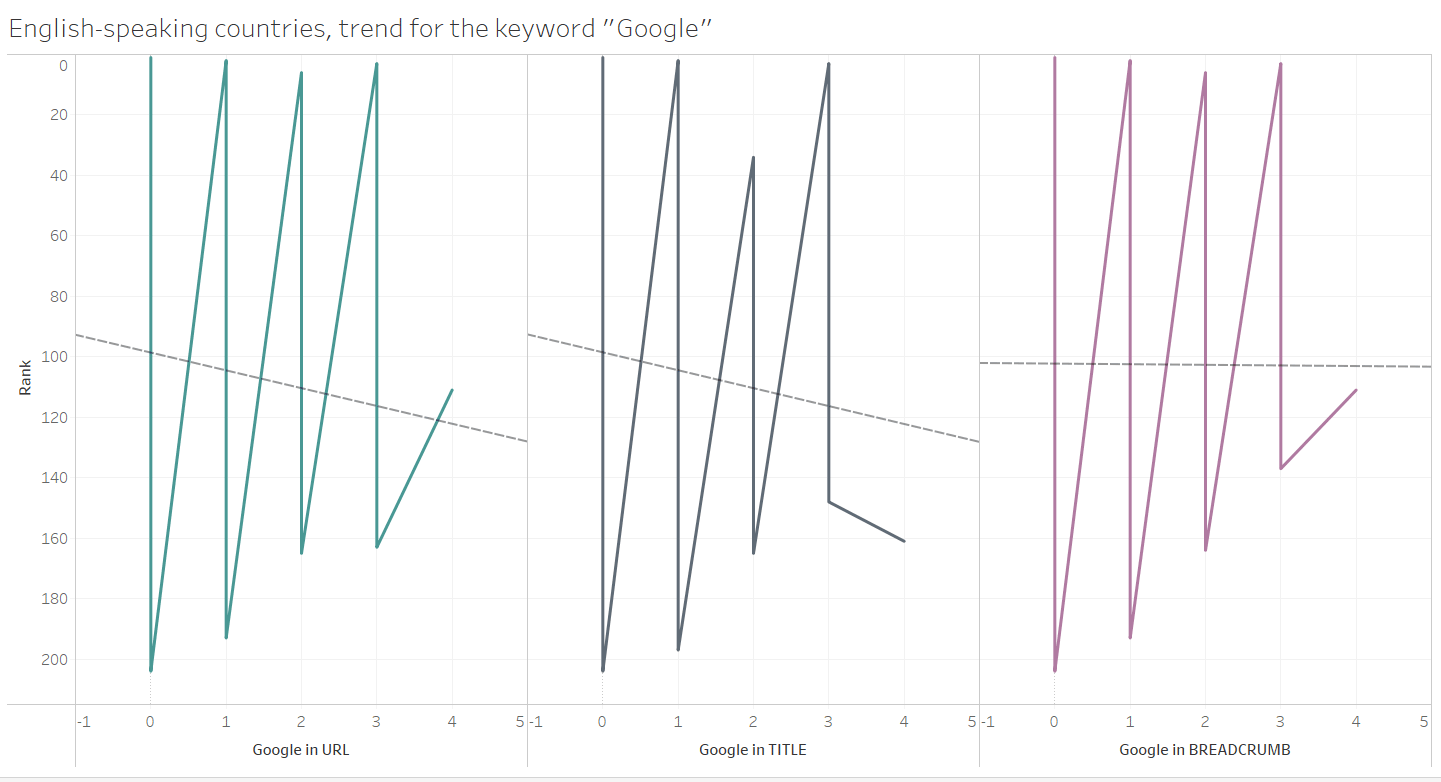 ● Localization and SERPs go hand in hand.
● Localization and SERPs go hand in hand.
○ People use search engines differently depending on the country or region, so you want to pick the primary keywords and semantically related keywords to target after running local keyword research.
○ While Google has learned to deal with misspelled words, you still want to pay attention to US vs. UK English spelling everywhere to rank higher in search results. For example, the data has shown that “search engine optimization” ranks poorly in the UK, but once we’ve changed the word into “opmisation,” the numbers came out differently.
○ Google cares about the user experience, so focus on crafting URLs that make sense for the local population.
○ As people’s searching habits change often, you want to test semantically related keywords periodically to make sure you’re not missing any ranking opportunities.
● Keyword stuffing is bad for ranking.
○ While you can have the primary keyword listed twice or even three times in your URL or metadata, it’s wise to test how much is too much. Keyword stuffing can lower your ranks in the long run.
○ You want to optimize the number of times you use the primary keyword and the semantically related keywords individually for URLs, metadata, and breadcrumbs.
○ On the other hand, eliminating a specific keyword from your metadata can also influence the overall performance, so you want to test until you find balance.
○ The number of times you use each term is essential, primarily for URLs and breadcrumbs.
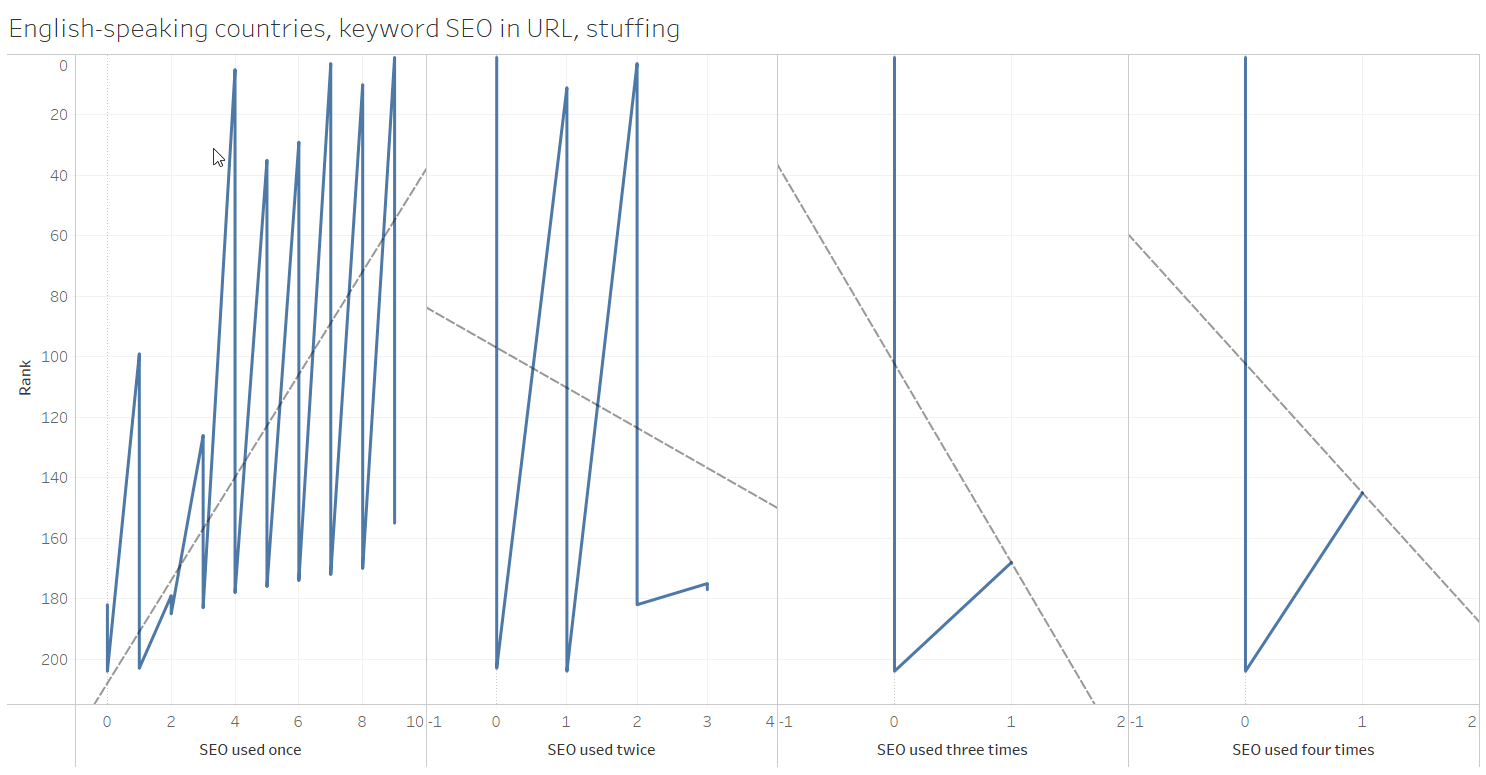
Language: German
Primary keyword: SEO
Semantically related keywords: “search engine optimization,” “Google ranking,” and “Suchmaschinenoptimierung” (the German word for search engine optimization)
Findings and keyword best practices:● Google doesn’t like keyword stuffing in titles.
○ When used a maximum of twice in a title, the main keyword positively impacts rankings.
○ Our findings confirms that Google penalizes the pages that include the main keyword 3+ times in titles.
○ Not using the main keyword also negatively impacts rankings.
○ Using semantically related keywords in titles has a positive impact, as long as you don’t use them more than twice.
○ Localization of titles matters – depending on the country you target, you might want to test various semantically related keywords to see which ranks higher in search results.
● Not all semantically related keywords have the same impact.
○ The data shows that using “Search engine optimization” in titles does not affect SERP in German-speaking countries as much as the local keywords.
○ The local semantically related keyword “Suchmaschinenoptimierung” is a game-changer, and titles that include this semantically related keyword rank better in all analyzed German-speaking countries.
○ On the other hand, using the term “search engine optimization” instead of the German word used to define the concept can impact page performance negatively.
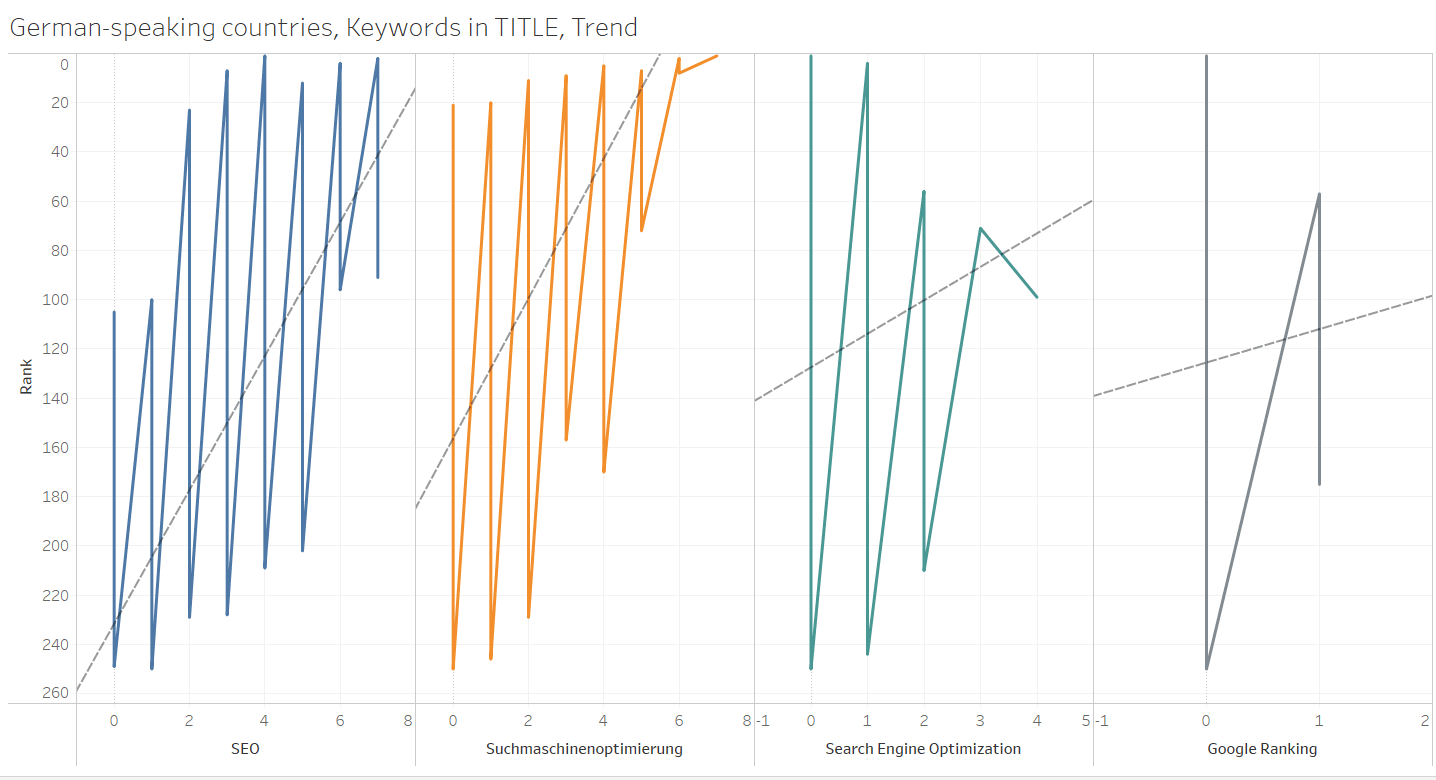 ● The number of keywords in breadcrumbs is a factor to keep an eye on.
● The number of keywords in breadcrumbs is a factor to keep an eye on.
○ Not using the main keyword in breadcrumbs can cause lower rankings.
○ The data reveals that Google penalizes keyword stuffing in breadcrumbs; use the primary keyword once or maximum twice.
○ Semantically related keywords in breadcrumbs don’t have the same impact as the main keyword.
○ If one semantically related keyword performs well in breadcrumbs, it doesn’t mean it will do the same for URLs and titles. You need to test various combinations until you optimize the metadata for each language.
● Prioritize user experience in URLs.
○ Keep your URL clear by avoiding keyword stuffing.
○ Using the same keyword more than twice in the URL negatively impacts ranking. However, using SEO only once in the URL doesn’t perform as well as URLs that contain the primary keyword twice in German-speaking countries.
○ Semantically related keywords in the URL can positively impact rankings, provided that you use terms that facilitate understanding.
○ For example, using the main keyword in the URL has almost no impact on rankings — because people don’t use the term as much as they use the German equivalent, “Suchmaschinenoptimierung.” In this case, the semantically related keyword becomes the primary term to rank for.
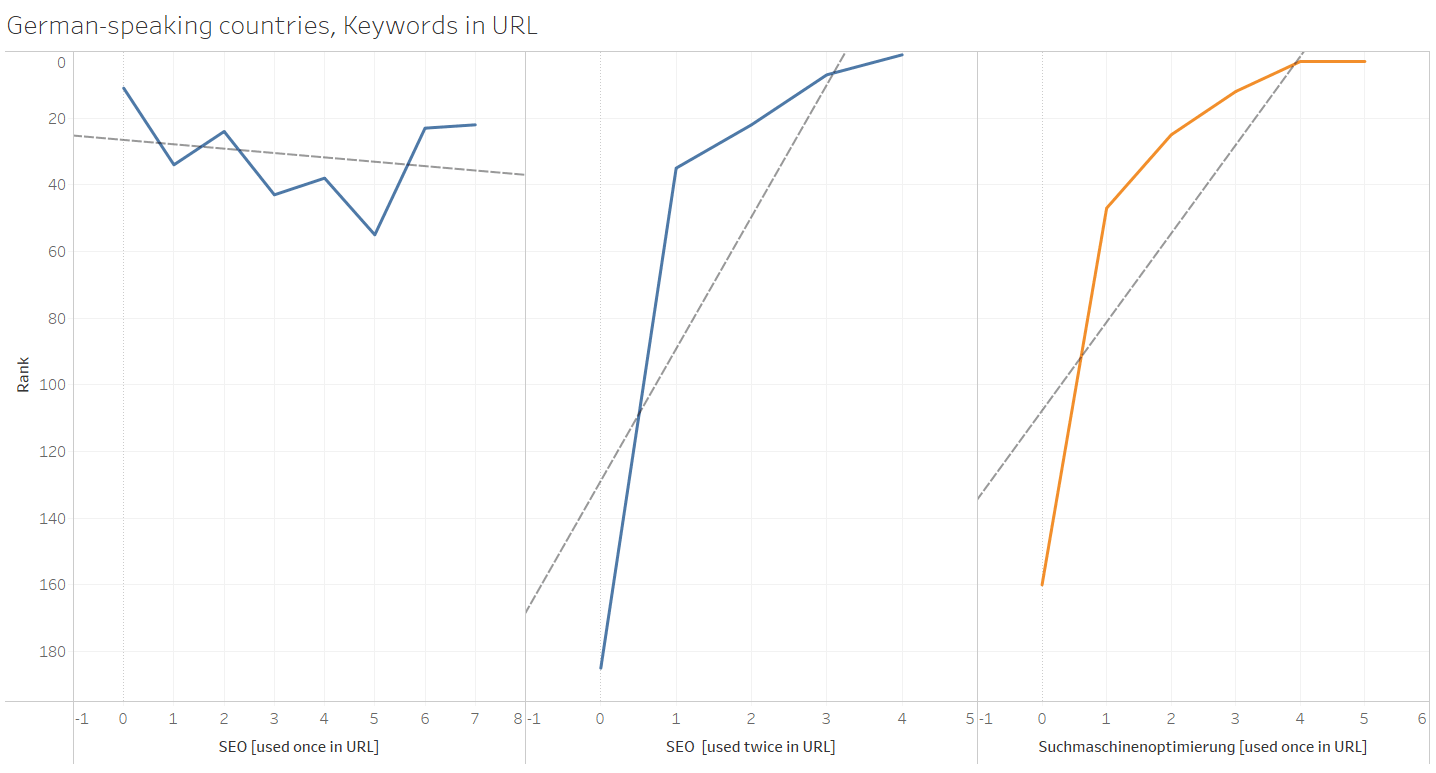 ● Use both the main keyword and semantically related keywords in the meta description.
● Use both the main keyword and semantically related keywords in the meta description.
○ Meta descriptions are still a vital ranking factor.
○ Descriptions that include the main keyword perform better than the descriptions that don’t use the exact term.
○ If you include the most popular local semantically related keyword in the description, you can reach a higher position in search results.
○ For example, in Switzerland, “search engine optimization” in the description performs better than the German term “Suchmaschinenoptimierung,” while the opposite is true in Germany.
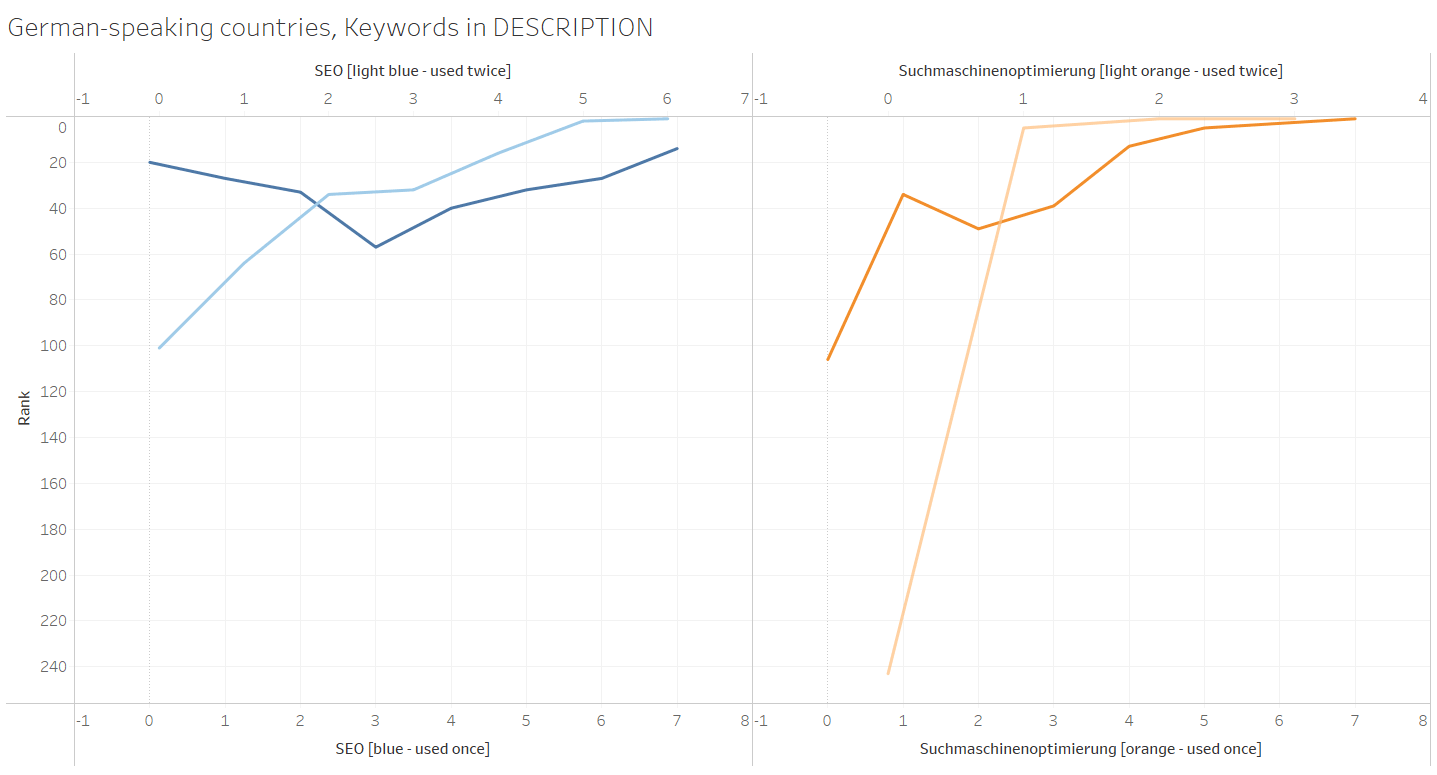
Language: French
Primary keyword: SEO
Semantically related keywords: “search engine optimization,” “optimisation pour les moteurs de recherche,” (French words for search engine optimization), and “référencement naturel” (French words for organic search)
Findings and keyword best practices:● Both the primary keyword and the semantically related keywords matter in titles:
○ The best-performing titles include the French term “référencement naturel”.
○ Our data showed that using “SEO” and the local keyword “optimisation pour les moteurs de recherche” in titles is also great for ranking in French.
○ Eliminating the term “SEO” from the title will have your page penalized by the search engine.
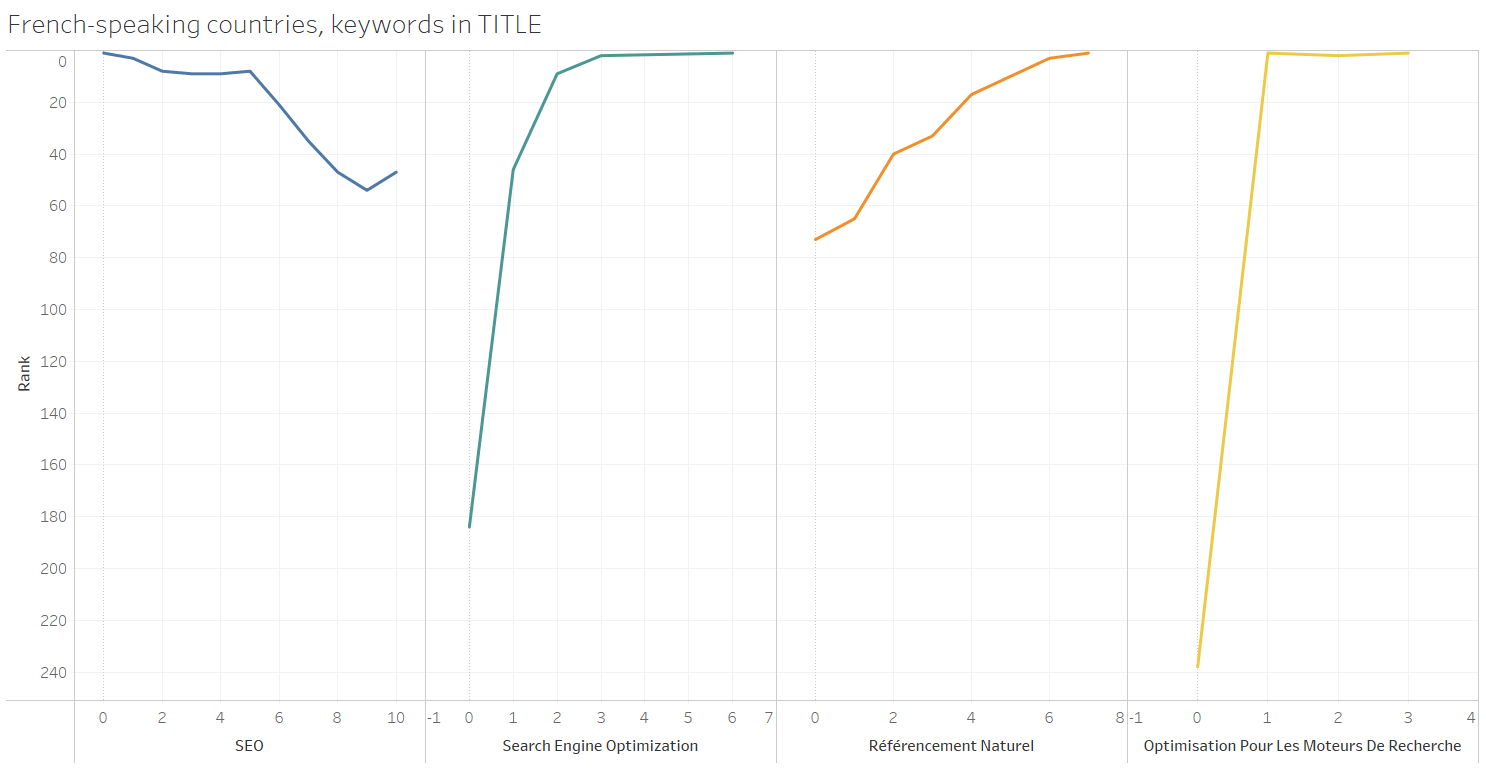 ● The primary keyword should be included in breadcrumbs and descriptions:
● The primary keyword should be included in breadcrumbs and descriptions:
○ The term “SEO” in breadcrumbs and meta descriptions is also a good ranking factor.
○ On the other hand, some semantically related keywords seem to have little to no impact when used in breadcrumbs, while others significantly impact.
○ You want to analyze data for each term to decide which one is more likely to influence your rankings.
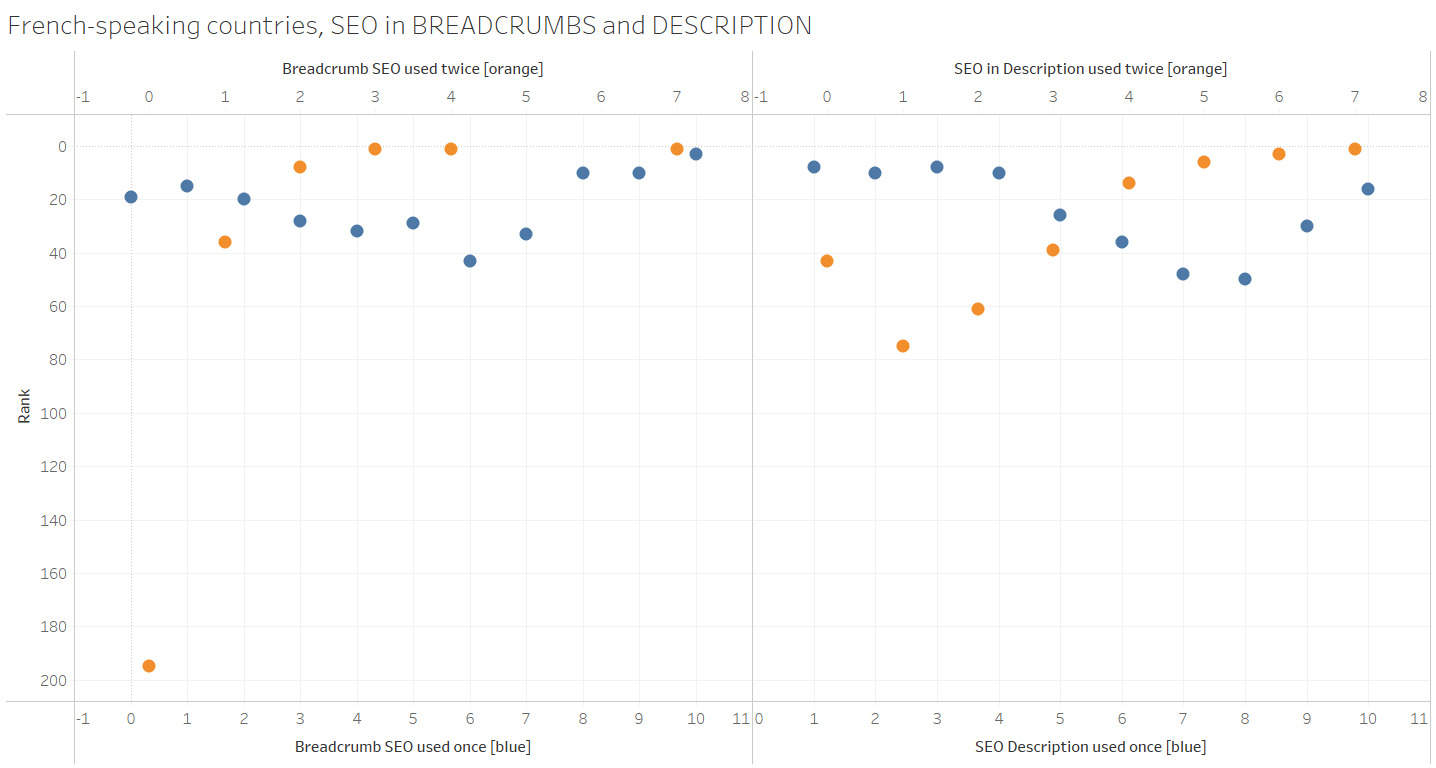 ● French internet users like a good translation more than Google does:
● French internet users like a good translation more than Google does:
○ The French translation of “search engine optimization” (“optimisation pour les moteurs de recherche”) and the local semantically related keyword “référencement naturel” are good ranking factors when used once in titles.
○ Synonyms impact rankings differently. While “référencement naturel” is a ranking factor, the data showed that the words “référencement organique” (which have a similar meaning) have an insignificant impact on ranking.
○ The English words “search engine optimization” can influence rankings, but the impact is low.
● Local keywords perform better in descriptions:
○ The terms “référencement naturel” and “optimisation pour les moteurs de recherche” have more impact in descriptions than the other keywords.
○ According to our findings each keyword should be used only once in the description for better results.
○ The data shows that Google penalizes the pages that don’t have the primary keyword in the description.
○ Semantically related keywords perform differently by country. For example, the words “search engine optimization” in the description make the site rank better in France than in Belgium, while having little to no effect in rankings in Switzerland.
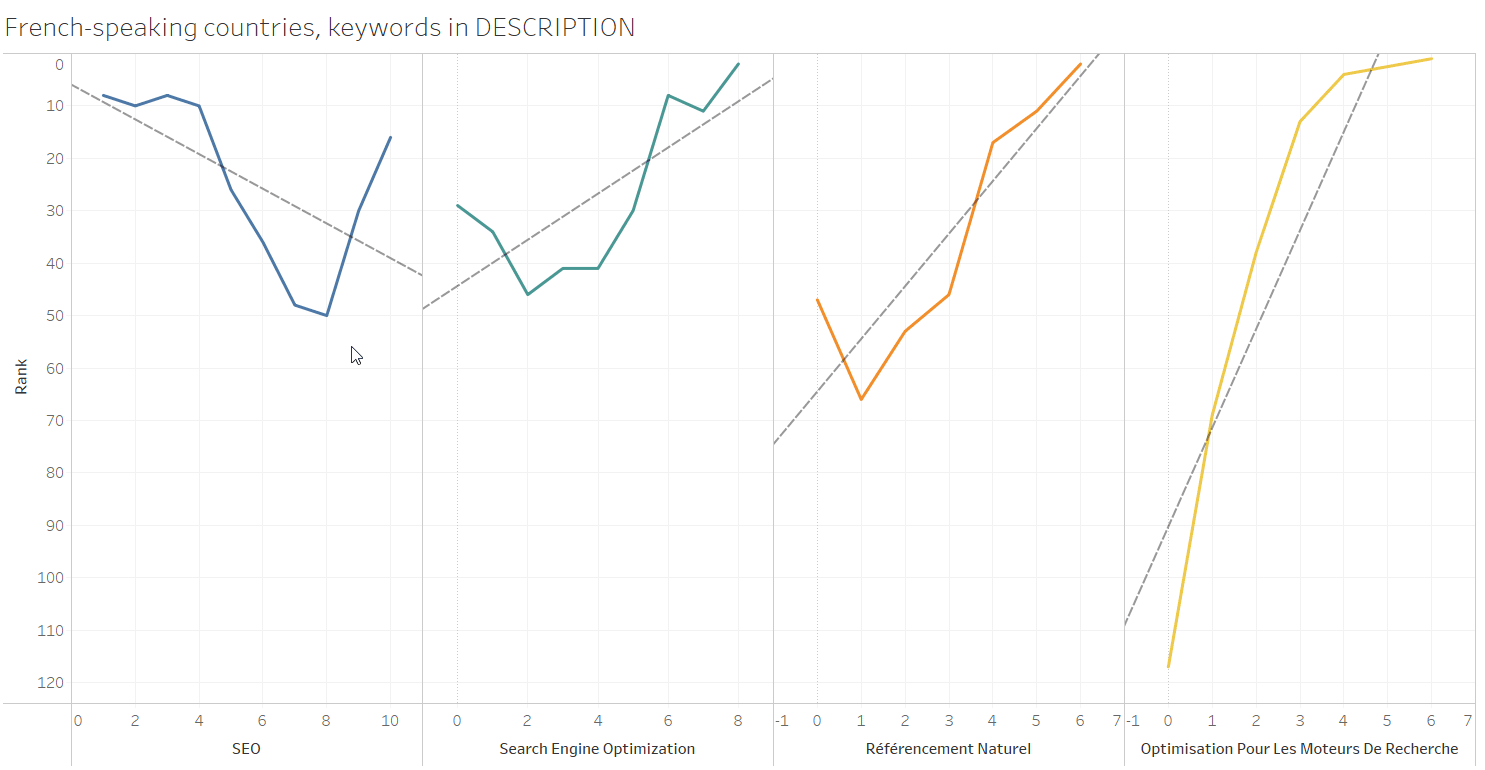
Language: Russian
Primary keyword: SEO
Semantically related keywords: “search engine optimization,” “CEO” (SEO, written using the Cyrillic alphabet), “оптимизация” (the Russian word for optimization), and “продвижение” (the Russian word for promotion)
Findings and keyword best practices:● People use “universal” terms to search information online:
○ Having the word “SEO” in URLs positively impacts rankings, and not including it reduces performance.
○ Overall, the primary keyword “SEO” doesn’t perform better than the Russian terms in titles and breadcrumbs.
○ However, the data shows that Google penalizes pages that don’t include the exact term “SEO” in the title, so you might need to mix multiple keywords to optimize your rankings.
○ Including the term “SEO” in the meta description doesn’t influence performance.
○ As expected local semantic-related keywords perform better than English terms.
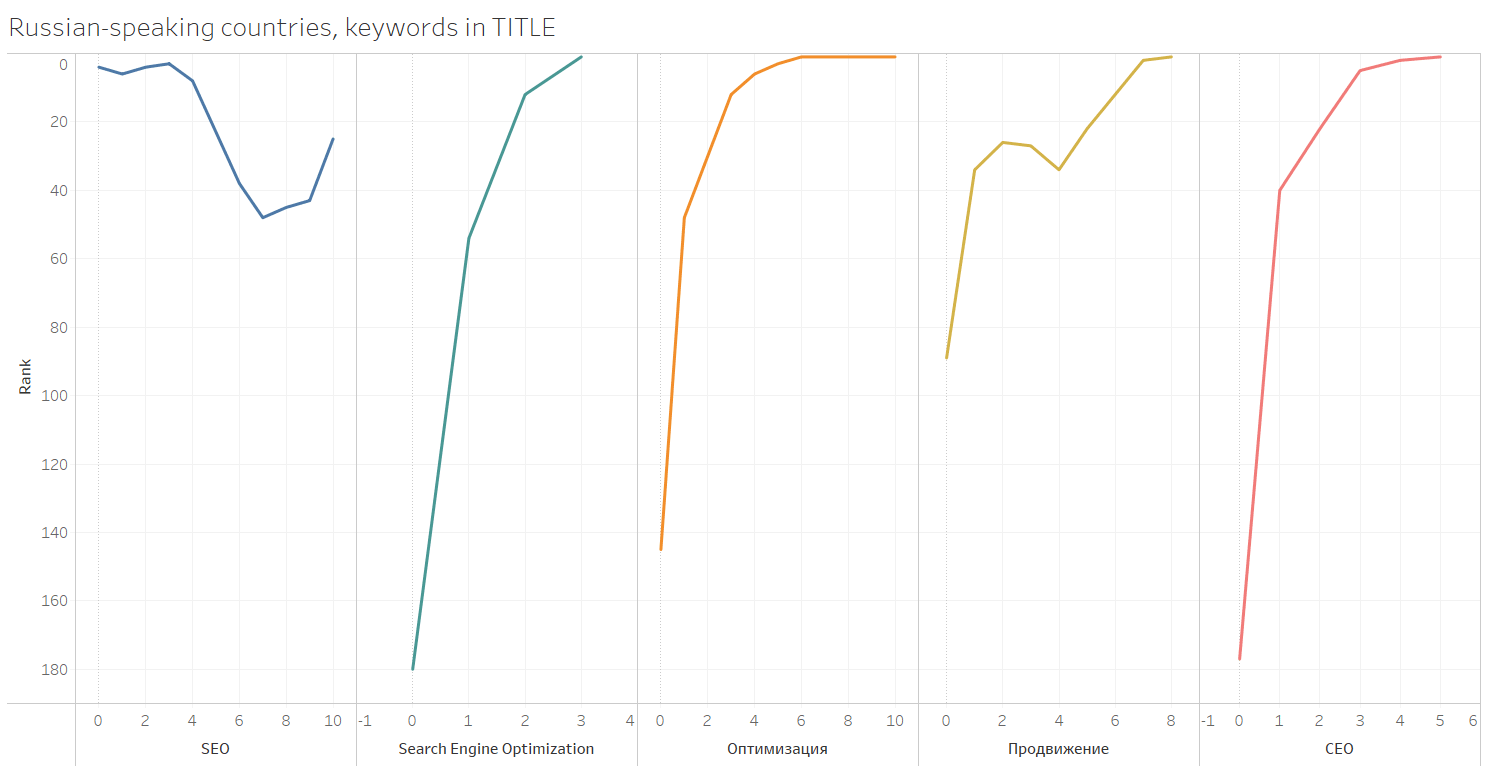 ● A lack of local keyword research negatively impacts ranking:
● A lack of local keyword research negatively impacts ranking:
○ Local keyword research beats semantically related keyword translation: using “search engine optimization” in meta descriptions has a negligible impact on rankings. The same term in titles can negatively impact performance.
○ On the other hand, the Russian terms “оптимизация” and “продвижение” make a significant difference for SERPs.
○ Moreover, the two Russian terms also have a notable impact on rankings when you use them in breadcrumbs and titles.
● For Russian, Google is rigid when it comes to keyword stuffing:
○ As a general rule, keyword stuffing is not recommended in any language, so if you try to add the primary keyword too many times in your metadata, you risk having your site penalized.
○ The best way to know how often you should use each term is by analyzing actual data.
○ Using local semantically related keywords in titles has a significant positive impact on ranking.
○ There’s not enough data to say how often you should use the local semantically related keywords in breadcrumbs.
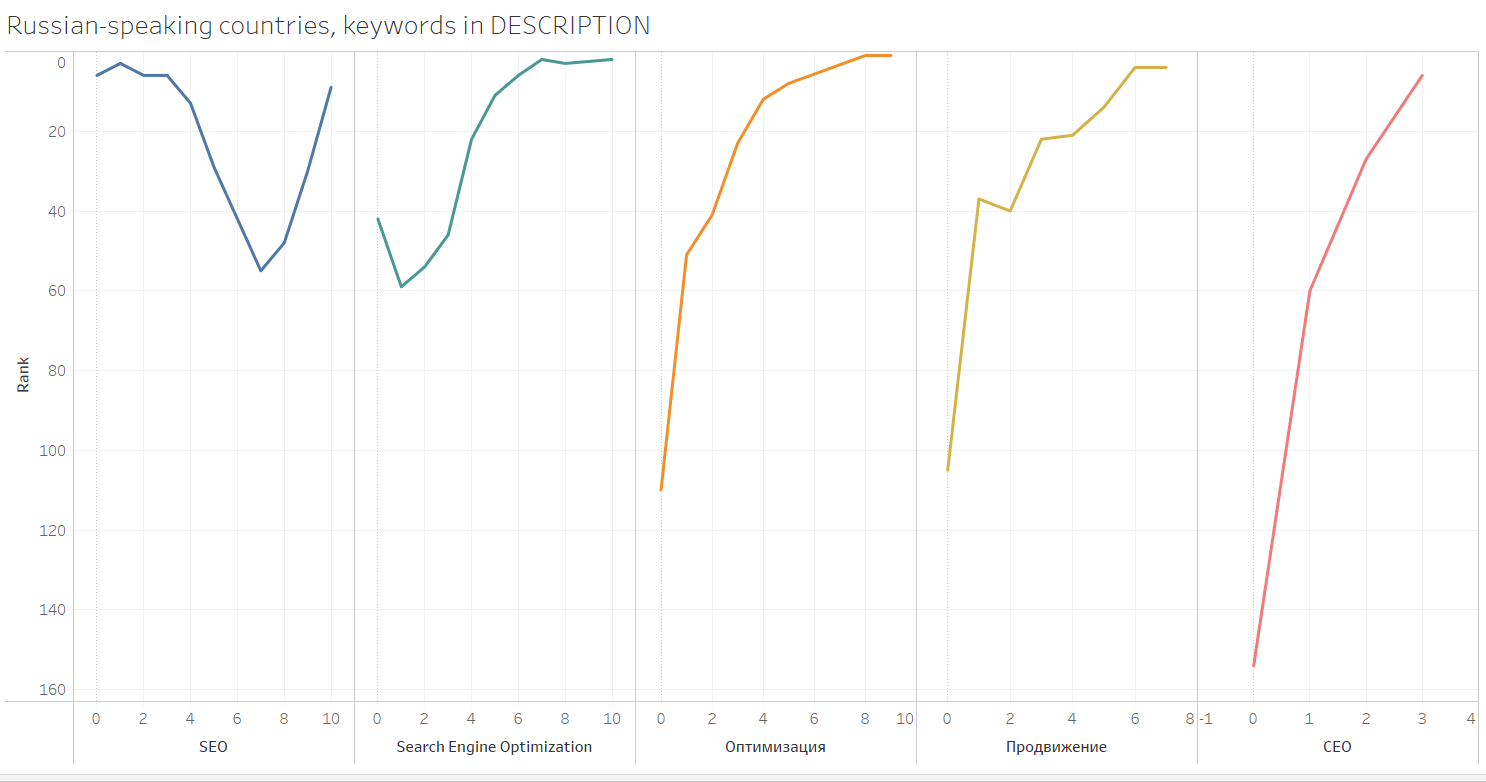 ● Not all semantically related keywords have the same impact:
● Not all semantically related keywords have the same impact:
○ The analysis of Russian websites showed that keywords have different relevance for SEO based on where you use them.
○ For example, the presence of the term “оптимизация” in breadcrumbs leads to a significantly better performance than all other keywords we’ve analyzed.
Conclusions
Our analysis has shown that keywords are still a fundamental SEO pillar, and strategically placing the correct terms in the back end of your pages can impact rankings in more than one way.
Google has mastered the art of providing excellent results to queries not just in English but in multiple languages, which means you must pay attention to context and user experience more than ever before.

The analysis confirmed what we’ve known for years. Each country has its particularities, and you need to mix “universal” terms with the local semantically related keywords to capture the attention of both search engines and local internet users. Data showed, one more time, that local keyword research is vital when you aim to rank high in search results with multilingual websites.
Another crucial fact we’ve noticed is that there’s no one-size-fits-all recipe for targeting the best-performing semantically related keywords. The only way to identify the winning combo is by performing WDF/IDF analysis, followed by local research to identify patterns and optimize metadata.
Suppose you want to revamp your website and boost SEO (or international SEO). In that case, you want to take a closer look at the data to identify the best configuration for your semantically related keywords in the metadata. The good news is, we can help with that. We can take your content, identify the best keywords to target, and perform data analysis for your countries and languages of interest.

Comments